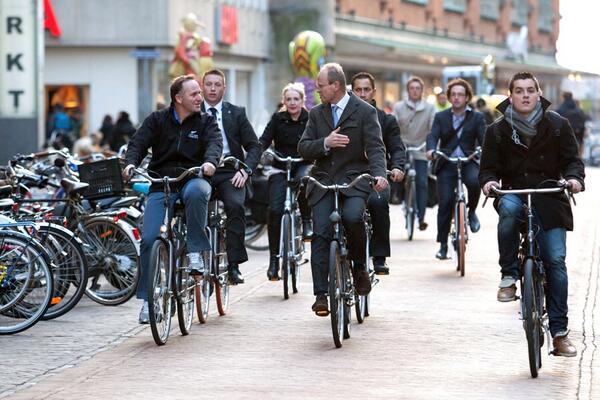The first days of spring are a great time to be on a bike – and it’s a pretty good time to be in the business of building cycle infrastructure too, with plenty of great projects on the go, and (hopefully!) more to come as the cycle boom attracts support locally and nationally.
So we’ve been taken aback to read that engineering consultancies Beca and Aurecon, both involved in major cycleway builds in Christchurch, have been reported as forbidding staff from cycling during work hours – even when they’re visiting their own bike-related projects:
Some staff working on Christchurch’s new cycleways are not allowed to cycle during work hours because of safety concerns.
The policies were due, in part, to the new Health and Safety at Work Act (HSWA), which came into effect last year.
Created in the wake of the Pike River mine disaster, the law imposes greater responsibility on senior managers to manage health and safety risks to their employees. It requires managing safety risks as much as reasonably practicable.
The story notes that these policies aren’t specific to the Garden City – they presumably also apply to Auckland or other locations where Beca and Aurecon operate.
First, credit where due: both firms are cited in the story as encouraging their staff to commute by bike, and Beca has even specified that they provide changing and parking facilities to back that encouragement up. Good stuff. (NB Aurecon hasn’t been quoted on their own practical actions to support staff who cycle commute – we’d welcome comment from them for inclusion here. See also good context from Patrick Morgan of CAN, speaking on Radio NZ).
So what’s the big deal over riding in business hours? A storm in a teacup over a few short trips, neither here nor there from a traffic or carbon perspective?
Well, from little things, big things grow – for good and for ill. Here’s three reasons why we’d encourage Beca and Aurecon (or any employer thinking about similar measures) to think again:
1. Consistency
As noted above, both firms named in the Press story say they encourage staff to cycle to and from work. Those commutes are likely to involve a range of distances across a wider range of road environments, and probably at relatively busy times of the day (at least for staff working standard full-time hours).
Set against commuting, it’s hard to believe that shorter daytime rides, to and from meetings or between sites, pose a safety risk that’s so much greater as to be uncontrollable without banning them entirely.
So why forbid these daytime trips on business, while commuting is encouraged? What’s the rationale here, in terms of comparative health and safety risks and ‘reasonably practical’ measures to reduce them – rather than just where liability sits in the event of an incident?
2. Empathy
If you’re building high-quality facilities to help more people make bikes part of their everyday life, the experience of staff who already ride seems like an invaluable resource – including experience of riding during the business day, as more and more people across our cities are already doing.
So why rule out riding for business purposes as an option, and give away any lessons that your people could be learning for current or future designs? And what impression is given when clients, project stakeholders or the public realise that daytime cycling is regarded as an unacceptable safety risk across the board?
3. Example-setting
We’re worried about the potential for other engineering consultancies to follow suit here – especially those with parent companies in the United States, where litigation and liability is such a hot topic. These companies are looked to as examples of design and engineering nous, here and overseas – so the attitudes they take to health and safety have the potential to ripple out across the business world here.
We’d hope to see an example set that includes a fair treatment of cycling as part of doing business, by treating it on a more equal footing with walking or driving – neither of which are demonstrably risk-free themselves.
What say you? We’d be keen for perspectives from either firm in the story, or from others in engineering or other industries, to help us get to grips with these policies and the concerns that are driving them – and hopefully to work towards a better way of treating those who bike for business.
Header image: a former top NZ statesman on a business meeting in The Hague, presumably during working hours. Photo from a tweet by @PWMSmit.




